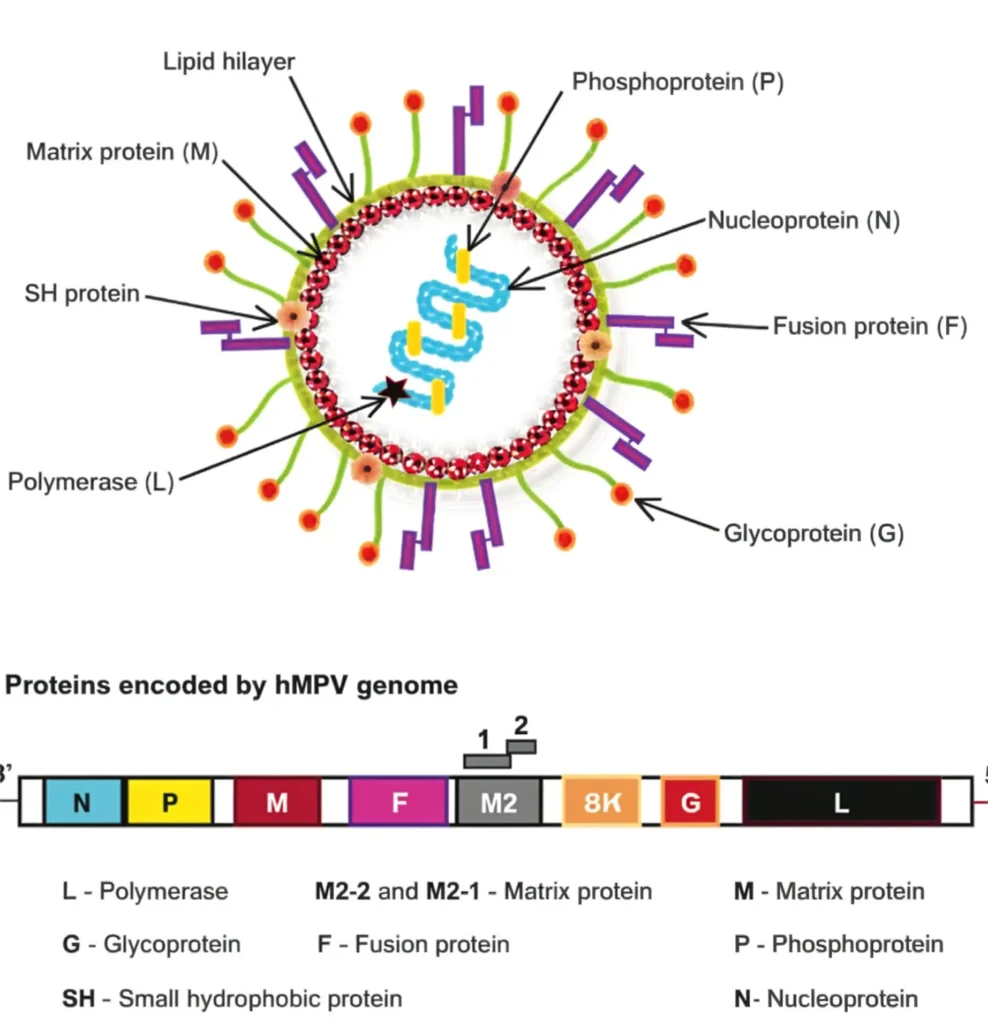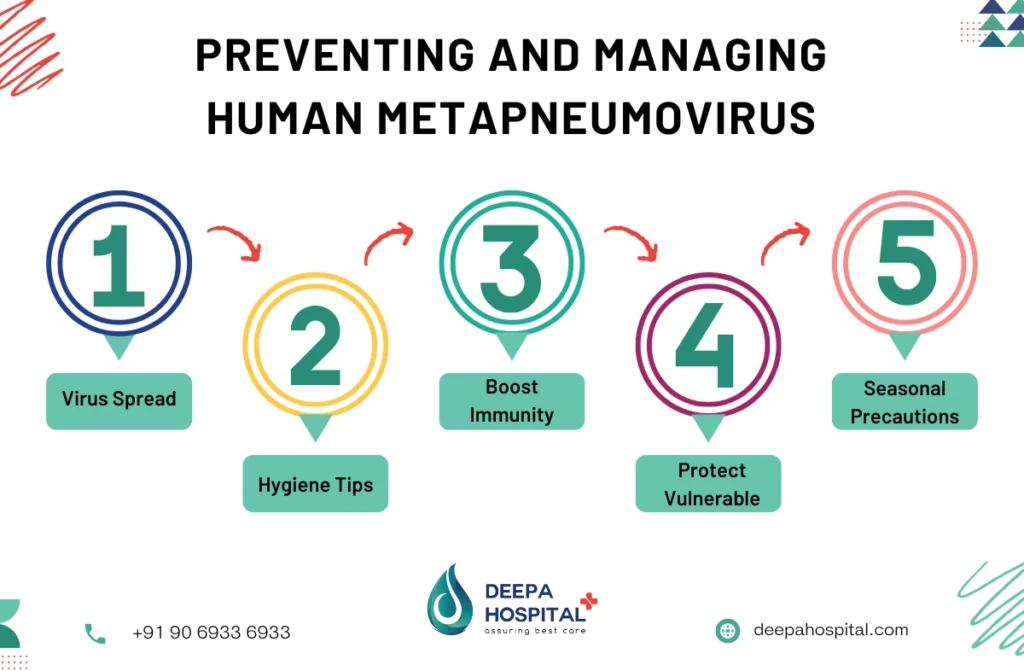Human Metapneumovirus Infection is a common yet often overlooked respiratory illness affecting people worldwide. At Deepa Hospitals, we specialize in identifying, treating, and managing such conditions with personalized care and advanced medical expertise. Understanding Human Metapneumovirus Infection and how it impacts different age groups can help ensure timely diagnosis and treatment, especially for vulnerable populations.
What Is Human Metapneumovirus Infection?
Human Metapneumovirus Infection is a viral respiratory illness caused by the human metapneumovirus (hMPV). This virus affects the upper and lower respiratory tract, often presenting symptoms similar to the flu or common cold. While it affects people of all ages, the infection is particularly concerning for infants, older adults, and those with compromised immune systems. The virus spreads through respiratory droplets and contact with contaminated surfaces, making it highly contagious.
Key points to know:
- Symptoms can range from mild cold-like issues to severe respiratory distress.
- The virus is most active during the late winter and spring months.
- Prompt treatment can help manage symptoms and prevent complications.

Human Metapneumovirus in Adults
Human Metapneumovirus in adults often presents differently compared to children. While young patients may experience severe symptoms, adults typically display milder cold or flu-like signs. However, older adults and individuals with pre-existing health conditions may face more severe complications.
What you should know:
- Common symptoms include cough, sore throat, nasal congestion, and fatigue.
- In severe cases, adults may experience pneumonia or bronchitis.
- Early intervention, especially for high-risk groups, is essential for managing Human Metapneumovirus in adults.
Additionally, adults with chronic conditions such as asthma or COPD are at higher risk of complications from Human Metapneumovirus in adults. Taking precautions during peak infection seasons is key to reducing risk.
How Long Does It Take to Recover From Human Metapneumovirus?
Recovery from Human Metapneumovirus Infection depends on the individual’s overall health and the severity of the infection. Most healthy adults and children recover within 7-10 days with supportive care, while those with weakened immune systems may take longer.
Key insights:
- Rest, hydration, and over-the-counter medications are crucial during recovery.
- Complications like pneumonia or severe respiratory distress can extend recovery times.
- Comprehensive care ensures effective symptom management and recovery.
For those asking, “How long does it take to recover from Human Metapneumovirus?” it’s important to understand that each case is unique. With proper medical attention, recovery times can be minimized.
What Are the Symptoms of Human Metapneumovirus?
Symptoms of Human Metapneumovirus Infection often mimic those of other respiratory illnesses, making diagnosis tricky without proper medical attention. Here’s what to watch for:
- Mild symptoms: Runny nose, cough, fever, and sore throat.
- Severe symptoms: Shortness of breath, wheezing, and chest pain.
- In high-risk individuals, the virus may lead to pneumonia or acute bronchitis.
If you or a loved one experience persistent respiratory symptoms, it’s crucial to seek medical advice promptly.
What Causes Human Metapneumovirus Infection?
Human Metapneumovirus Infection is caused by the human metapneumovirus, a virus belonging to the Paramyxoviridae family. The virus spreads through:
- Respiratory droplets: Sneezing or coughing near others.
- Direct contact: Touching contaminated surfaces and then touching the face.
- Close proximity: Living in crowded or shared spaces.
Preventive measures, such as hand hygiene and avoiding close contact with sick individuals, can significantly reduce the risk of infection.
Who Is at Risk of Human Metapneumovirus Infections?
Certain groups are more susceptible to developing severe cases of Human Metapneumovirus Infection. High-risk categories include:
- Infants and young children.
- Elderly individuals, particularly those over 65.
- People with chronic conditions like asthma or heart disease.
- Immunocompromised individuals, such as those undergoing chemotherapy or living with HIV.
Understanding these risks can help families take proactive steps toward prevention and early treatment. Adults asking about Human Metapneumovirus in adults should be aware of their specific risk factors.
Preventing and Managing Human Metapneumovirus
While there is no vaccine for Human Metapneumovirus Infection, simple steps can help minimize the risk of infection. Prevention and management strategies include:
- Hygiene practices: Washing hands frequently with soap and water.
- Avoiding close contact: Staying away from infected individuals.
- Healthy habits: Eating a balanced diet, exercising regularly, and ensuring proper sleep.
If infected, following the treatment plan provided by your healthcare provider is essential. For those wondering, “How long does it take to recover from Human Metapneumovirus?” a proactive approach to care can speed up recovery times.
How Is Human Metapneumovirus Diagnosed?
Diagnosing Human Metapneumovirus Infection typically involves a combination of medical history, physical examination, and laboratory tests. These tests may include:
- Nasal or throat swabs: To detect the presence of the virus.
- Chest X-rays: To rule out complications like pneumonia.
- Blood tests: To check for markers of infection.
Early and accurate diagnosis ensures timely intervention and reduces the risk of severe complications.
How Is Human Metapneumovirus Treated?
Treatment for Human Metapneumovirus Infection focuses on relieving symptoms and preventing complications. While there’s no specific antiviral medication for hMPV, supportive care can make a significant difference. Treatments may include:
- Over-the-counter medications for fever and pain relief.
- Nebulizers or inhalers for breathing difficulties.
- Oxygen therapy in severe cases.
For those wondering, “How long does it take to recover from Human Metapneumovirus?” supportive treatments can help ensure a quicker and more comfortable recovery.
What Are the Risk Factors for Human Metapneumovirus?
Risk factors for developing Human Metapneumovirus Infection include:
- Age: Infants and elderly individuals are more vulnerable.
- Health conditions: Chronic diseases like COPD or asthma increase the risk.
- Environment: Crowded living conditions and exposure to pollutants.
Recognizing these risk factors can help you take preventive measures to protect yourself and your loved ones.

Conclusion
Human Metapneumovirus Infection, while often mild, can lead to severe complications in high-risk individuals. Understanding the symptoms, causes, and preventive measures is essential for managing this condition effectively. At Deepa Hospitals, our expert team is here to provide personalized care and support for those affected by respiratory illnesses.

